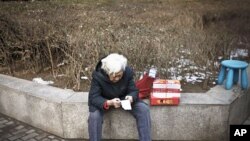About 3,000 delegates from around the country are in Beijing to take part in China’s annual National People’s Congress. One of their top priorities is expected to be improving life for the poor as part of efforts to prevent unrest.
As China prepares for the opening of the National People’s Congress on Saturday, the government has said that maintaining social stability is its paramount concern.
In a recent online chat with Chinese people, Premier Wen Jiabao said one way the government hopes to prevent social problems is by helping the poor.
Wen says the issue of raising peoples’ living standards will be the starting point of every regulation in the country’s next five year plan, from 2011 to 2015.
During this year’s week-long session, the legislature will give final approval to the plan. It sets out the ruling Communist Party’s goals for the country and was already approved at a party leadership meeting last year.
The government says in 2009, nearly 36 million people lived below its poverty line of about $180 a person a year, or about 49 cents a day. That is just one third the amount the World Bank uses for its poverty line, which would rank as many as 150 million Chinese as extremely poor.
The premier signaled the government also plans to tackle two politically sensitive problems - corruption and inflation.
Wen says because inflation affects people’s lives and also can affect social stability, the Chinese government considers maintaining price stability a "big issue"”
Inflation in January was 4.9 percent, but food prices rose more than 10 percent.
Public policy Professor Huang Jing at the University of Singapore says he thinks stamping out corruption should be one of the government’s top priorities.
"For them, the choice is actually very difficult, but very simple - you are either going to die with corruption, just like a cancer, or you have to cut it out,” Huang said. “The problem for them now is which part to cut first."
Huang says the other major issue for the government is the growing wealth gap, which sees urban residents making three times as much as Chinese in the countryside. He says China has accumulated wealth over the past 30 years of economic opening, but needs political reforms if it wants to spread the wealth more evenly among the population.
"We know that when you try to create wealth, you do not necessarily need a new political system, but when you distribute wealth, you always need a new political system. If you look at all the political reforms, political revolutions, it is all caused by the distribution of wealth," Huang states.
The Chinese government equates political reform with social instability and so has made great efforts to stifle public calls for greater government accountability.
Heavy security in cities around China has discouraged people from gathering to oppose injustice and show sympathy with the Jasmine Revolutions that have spread across the Middle East.
At one would-be protest in Beijing Sunday, security forces beat and harassed foreign journalists who attempted to cover it. Scores of activists were rounded up ahead of time to keep them from demonstrating.
One Beijing activist, who asked that her name not be used, says she would have taken part if authorities had not taken her to a Beijing hotel the day before the planned demonstration. She can still make phone calls, but cannot leave.
The woman says police told her she will be free to go on March 20, after the National People’s Congress is over.
Dissident Bao Tong is the highest ranking former official jailed for opposing the use of force against Tiananmen Square pro-democracy protesters in 1989.
He sees the police reaction as a sign of what he describes as the government’s nervousness about dissent.
Bao says he thinks the government should not be nervous and instead should spend its energy worrying about how to solve the country’s problems.
China’s Legislature Focuses on Country’s Wealth Gap




